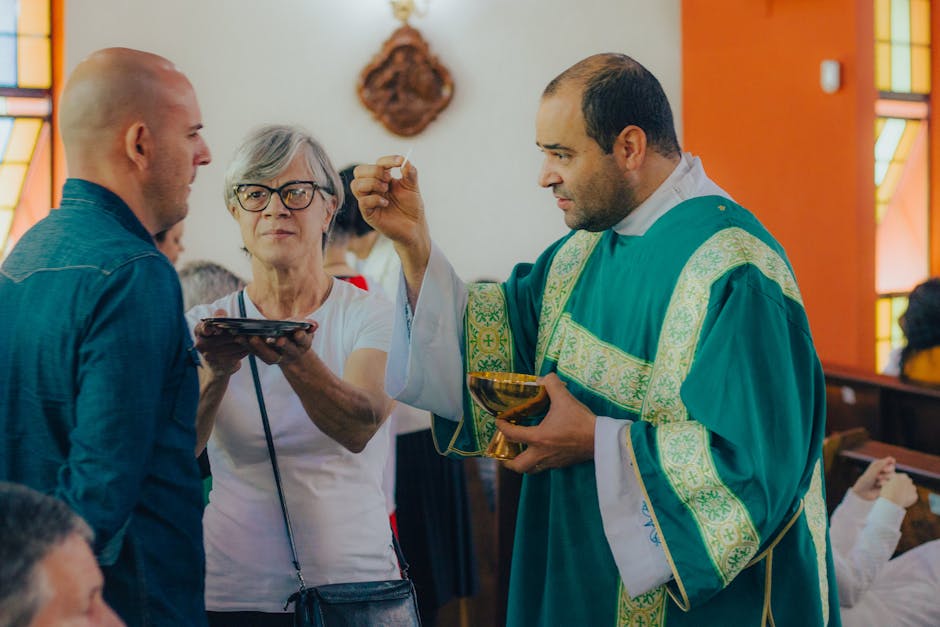In the bustling markets of 12th-century Cremona, Italy, a merchant moved through the crowds with unusual purpose. Unlike many of his contemporaries, Homobonus Tucenghi wasn’t merely concerned with profit margins and inventory—his business practices were infused with a profound spiritual commitment that would eventually lead to his canonization as the patron saint of business people, merchants, and tailors.
St. Homobonus (whose name fittingly translates to “good man”) stands as a remarkable figure in Catholic tradition: one of very few saints who was a businessman and remained one throughout his life. Born to a prosperous merchant family, he inherited his father’s clothing business and transformed it into a model of ethical commerce that challenges and inspires business leaders to this day.
What makes his story particularly remarkable is the speed of his canonization. After his death in 1197 while attending Mass at St. Giles Church in Cremona, Homobonus was canonized by Pope Innocent III just one year later—an unusually swift recognition that speaks to the profound impact of his life and witness.
Key Business Virtues Exemplified by St. Homobonus
Integrity in Commerce
At a time when dishonest business practices were commonplace, Homobonus distinguished himself through scrupulous honesty and fair dealing. Historical accounts suggest he refused to engage in the price gouging and deceptive marketing tactics that were standard practice in medieval marketplaces.
Homobonus insisted on transparent pricing, quality merchandise, and honest representation of his goods. Perhaps most notably, he maintained these standards even when adherence to them wasn’t profitable. During economic downturns or when competitors undercut his prices through dubious means, he remained steadfast in his commitment to ethical business practices.
This principled approach eventually became his competitive advantage. As word spread of his reliability, customers sought him out specifically, willing to pay fair prices for the assurance of honest treatment.
Integration of Faith and Work
While many viewed business and spiritual devotion as separate realms, Homobonus demonstrated their natural integration. Historical records indicate he attended Mass daily, beginning each morning in prayer before opening his shop. This wasn’t merely a ritualistic obligation but a foundational practice that informed his business decisions.
His spiritual discipline didn’t diminish his business acumen—it enhanced it. By grounding himself in prayer and scripture, he developed the discernment to navigate complex business challenges with wisdom and foresight. His approach reminds modern business leaders that spiritual practices aren’t distractions from business success but potential catalysts for it.
Charitable Business Model
Perhaps most revolutionary was Homobonus’s approach to wealth. In an era of dramatic inequality, he pioneered what we might now call a “social enterprise” model. His business success wasn’t an end in itself but a means to serve his community.
Historical accounts describe how he regularly used his profits to provide food, clothing, and dowries for the poor. He employed widows and disadvantaged community members in his business operations, providing dignified work opportunities rather than mere handouts.
Most notably, his charitable giving wasn’t an afterthought or a response to excess wealth—it was built into his business model from the beginning, a systematic and sustained commitment to using commerce as a vehicle for compassion.
Practical Applications for Modern Business Owners
Creating Transparent Pricing and Business Practices
Modern business owners can follow Homobonus’s example by embracing radical transparency:
- Clear Pricing Structures: Eliminate hidden fees and clearly communicate how prices are determined
- Open Books Management: Consider sharing financial information with employees and even customers
- Ethical Supply Chain Management: Thoroughly vet suppliers and publicly disclose sourcing practices
- Honest Marketing: Avoid exaggerated claims and be forthright about both the strengths and limitations of products and services
This transparency might initially seem risky in competitive markets, but like Homobonus, businesses often find that honesty becomes a powerful differentiator that builds customer loyalty and employee trust.
Building Community Support into Your Business Model
Rather than treating charitable giving as separate from business operations, consider:
- Buy-One-Give-One Models: For each product sold, donate a similar product to those in need
- Community Investment Funds: Allocate a fixed percentage of profits to local community development
- Skills-Based Volunteering Programs: Offer your business expertise to nonprofit organizations
- Hiring from Marginalized Communities: Create pathways to employment for those traditionally excluded from economic opportunity
Balancing Profitability with Generosity
Homobonus demonstrates that profitability and generosity aren’t opposing forces but complementary dynamics:
- Stakeholder Capitalism: Move beyond shareholder primacy to consider the wellbeing of employees, customers, suppliers, and communities in business decisions
- Fair Wage Policies: Ensure all employees receive living wages rather than just market-rate compensation
- Profit Caps and Redistribution: Consider setting maximum profit margins with excess directed to employee benefits or community initiatives
- Customer Assistance Programs: Create sliding-scale payment options or assistance funds for customers in financial difficulty
Time Management Strategies for Spiritual Practice and Business Success
Homobonus’s daily Mass attendance offers a model for modern business leaders seeking spiritual grounding:
- Morning Spiritual Routine: Begin each day with prayer, meditation, or spiritual reading before engaging with business demands
- Sacred Pauses: Schedule brief moments throughout the workday for centering and reconnection with core values
- Sabbath Practices: Establish firm boundaries around work time, creating space for rest, worship, and family
- Retreats and Reflection: Schedule regular periods of extended spiritual reflection to reassess business direction and purpose
Contemporary Catholic Businesses Following St. Homobonus’s Example
Case Studies of Faith-Integrated Businesses
Magdalene House and Thistle Farms (Nashville, TN) Founded by Episcopal priest Becca Stevens, this organization provides housing, healing, and employment for women survivors of trafficking, prostitution, and addiction. Their social enterprise manufacturing body care products employs program participants, with profits supporting the organization’s mission.
Divine Chocolate This chocolate company is co-owned by the Kuapa Kokoo farmers’ cooperative in Ghana, ensuring cocoa farmers receive fair prices and have an ownership stake in the business. Their model combines commercial success with dignified treatment of producers.
DePaul Industries This Oregon-based organization provides employment opportunities for people with disabilities through staffing, security services, and food packaging businesses. Their model demonstrates how commercial success can create meaningful work opportunities for marginalized populations.
Practical Frameworks for Implementation
The Economy of Communion Model Developed within the Focolare Movement, this business framework encourages companies to divide profits into three parts: reinvestment in the business, direct help for those in need, and building “structures of communion” that promote a more equitable economy.
Catholic Social Teaching Business Assessment Some organizations have developed assessment tools based on Catholic Social Teaching principles including:
- Dignity of the human person
- Solidarity and the common good
- Rights and responsibilities
- Option for the poor
- Care for creation
- Dignity of work
These frameworks provide practical ways to evaluate business decisions against the virtues exemplified by St. Homobonus.
Prayers and Reflections for Business Decisions
Traditional Prayers to St. Homobonus
For Business Guidance
O blessed St. Homobonus, patron of business people, who combined commercial success with unwavering integrity and generosity, guide my business decisions. Help me to serve my customers honestly, treat my employees justly, and use the fruits of my labor for the common good. May I, like you, find in my daily work an opportunity to glorify God and serve my neighbor. Amen.
For Ethical Clarity
St. Homobonus, when faced with difficult ethical choices in my business, lend me your wisdom and courage. Help me to see beyond short-term gain to the lasting impact of my decisions. May I choose the path of integrity even when it seems costly, trusting that faithfulness bears fruit in its proper season. Amen.
Reflection Questions for Business Discernment
When facing challenging business decisions, consider these reflection questions inspired by St. Homobonus’s example:
- Does this decision uphold the dignity of everyone involved—employees, customers, suppliers, and community members?
- Am I being completely honest, or am I tempted to withhold information that might affect others’ choices?
- How does this decision affect the most vulnerable people connected to my business?
- Would I feel comfortable explaining this decision to my faith community?
- Does this choice reflect not just what is legally permissible but what truly serves the common good?
- How might this decision look different if profit were my secondary rather than primary consideration?
Conclusion
In an economic landscape often dominated by short-term thinking and narrow definitions of success, St. Homobonus offers a compelling alternative vision. His life demonstrates that business leadership can be a genuine vocation—a calling to create value, serve others, and transform communities through ethical commerce.
The merchants of medieval Cremona likely viewed Homobonus’s business practices with skepticism. His daily Mass attendance must have seemed impractical, his fair pricing naïve, his generosity excessive. Yet history vindicates his approach. While countless profit-maximizing merchants of his era have been forgotten, Homobonus’s legacy endures, challenging each new generation of business leaders to higher standards.
In following his example, modern business owners need not choose between commercial success and spiritual integrity. Rather, like Homobonus, they can discover how deeply these aspects of life can reinforce and enrich each other, creating enterprises that prosper by serving the authentic needs of humanity.




